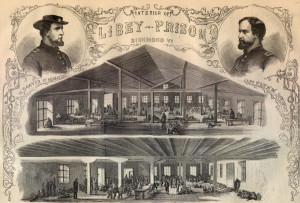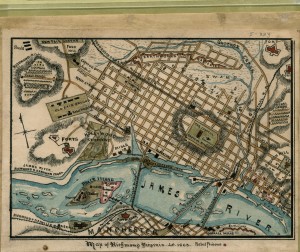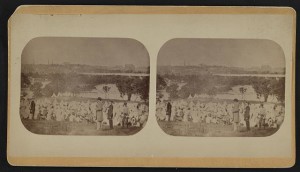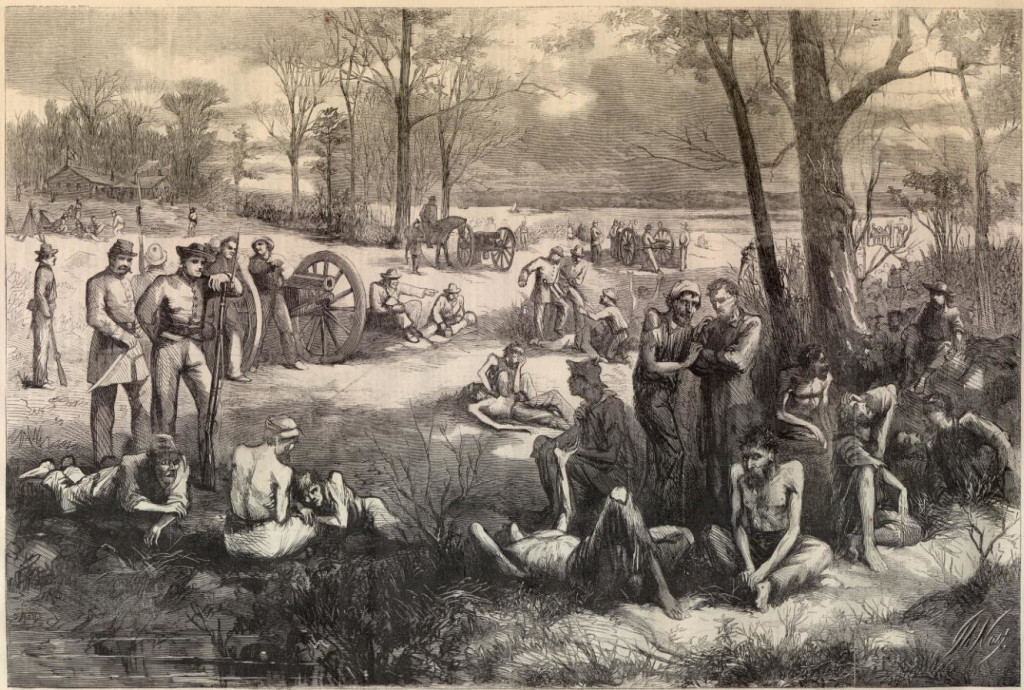Richmond was just about overflowing with Yankee prisoners. Some were being disposed to Danville and Lynchburg.
From the Richmond Daily Dispatch November 14, 1863:
The prisoners of War in Richmond.
The morning report of the Libby prison yesterday shows the following number of Yankee prisoners now in the prisons in and around Richmond: Prisoners of war, 12, 747; citizen prisoners, 3; Yankee deserters, 3; negroes, 22; total, 12,775. Among these are 953 commissioned officers of different grades, from Brigadier-General down to Third Lieutenant. There are also 84 surgeons in the lot. Seven hundred of these prisoners were yesterday sent to Danville, and 700 will be sent daily to that point until 4,000 are thus disposed of. It is understood that several thousand will also be sent to Lynchburg.
The day before the Dispatch editorialized on the difficulties of having to take care of thousands of Yankee prisoners, especially given the worsening economic condition in Richmond. From the Richmond Daily Dispatch November 13, 1863:
The Yankee prisoners.
The persistent lies of the Yankee journals about the starvation and cruel treatment of their prisoners in Richmond are only intended to blow up the declining war spirit in the North, and to justify themselves upon the pretext of an abominable falsehood, in inflicting new cruelties upon our unhappy captives in their hands. We have made inquiries upon the subject which satisfy us that all is done for the support and comfort of the Yankee multitude which the Confederate Government is capable of doing. A fact came to our notice yesterday morning which will be a striking illustration of the true state of things to all fair minds. Several persons of respectable standing in this community were endeavoring to obtain a small quantity of some portions of the beef which have been permitted to be sold at the commissary shops to the general public, but were informed by the man in charge that they could not have it, as it was now required by the Yankee prisoners. Here are our people dented provisions for themselves and their children to feed these Yankees, who have come to destroy us! We do not mention this in the way of complaint; on the contrary we give the Government credit for its merciful disposition, but this single fact sufficiently disproves the base and malignant falsehood that we are seeking to starve the Yankees, when, in reality, it is our own people that are in danger of starving in order that these prisoners may be fed.

INTERIOR VIEW OF LIBEY PRISON, RICHMOND, VIRGINIA, SHOWING THE QUARTERS OF THE UNION OFFICERS CONFINED THERE.—SKETCHED BY CAPTAIN HARRY E. WRIGLEY, TOPOGRAPHICAL ENGINEERS.
To any one willing to listen to reason and truth, it must be apparent that thirteen thousand Yankee prisoners thrust upon a community already overcrowded, and having great difficulty to provide the plainest articles of food for its own tables, cannot expect, with the best dispositions on our part’ to fare sumptuously every day. We know people, once in affluence, who would be glad to be assured of as liberal a daily provision as these Yankee prisoners. It may be that their food is plain, and not abundant, but it is as good and as plentiful as, with our straightened means, we can supply. Liars ought to have good memories, and to keep up a show at least of consistency, and therefore we would suggest to the mendacious Yankee scribes who accuse us of deliberately starving our prisoners, whether, if it be true, as they daily assert, that the people of Richmond are threatened with the horrors of famine, it may not be that the alleged famine among their prisoners is involuntary? If we are starving ourselves, how can we keep them from starving? But the truth is, that, though straightened in our own means of life, we are doing as well for our prisoners as for ourselves. Seventy bullocks a day are sacrificed for their commissariat, and bread in proportion to their numbers. Our own people, as we know of our own personal knowledge, are in some cases denied meat for their own families, because it is necessary for the Yankees. Thus much we say, not because we consider any explanation due to our enemies, or likely to be satisfactory, but because the facts ought to be known, in vindication of our own character, and in justice to our own prisoners whom they wish to harass and torture upon a false and malignant pretext.
In regard to accommodation it is undoubtedly true that we are deficient in the means of comfortably accommodating the multitude on our hands. We had no room in Richmond before the war for a large surplus population. Since the war our population has been doubled; people who once lived in large mansions are glad to get two rooms, the Confederate Government has been compelled to occupy for the uses of State many of our principal public edifices. Artisans and builders having been drawn upon largely for the army, very little building has been going on since the war commenced. The consequence is, that after packing all our spare factories with Yankee prisoners, we have been compelled to encamp the others on Belle Isle, which is the most agreeable of places in summer, but not better in winter than the usual winter quarters of soldiers.–What can we do? Arrangements have been made to send them away as fast as we can find places for them in the interior of the country, and in the meantime they must submit to a disagreeable position with the best philosophy they can, knowing that it is the result of necessity and not of wanton cruelty on our part.
We have abstained from referring to the unspeakable horrors which our prisoners have suffered in Fort Delaware and other Yankee prisons, because two wrongs do not make a right. But we may at least say to the Yankee prisoners that if they suffer here it is not our fault, who cannot help it; but the fault of their own Government, who will not exchange prisoners — who will only send us back our sick and wounded men, and when we return others in the same condition, basely and of wanton malice pretend that their sufferings are the result of starvation in Southern prisons.
The Dix–Hill Cartel that regulated prisoner parole and exchange started breaking down toward the end of 1862. By June 1863 exchanges had almost ceased. Two big issues were the Confederates government’s refusal to parole captured black Union soldiers and the return to service of some paroled but non-exchanged Confederates soldiers.[1]
The interior view of Libby was published in the October 17, 1863 issue of Harper’s Weekly (at Son of the South
The following image of Union prisoners on Belle Isle was published in the December 5, 1863 issue of Harper’s Weekly (at Son of the South). A report from the Union perspective (Confederates suffered in Union prisons, too.) accompanies the drawing.
- [1]McPherson, James M. The Battle Cry of Freedom: The Civil War Era. New York: Ballantine Books, 1989. Print. pages 792-793.↩



